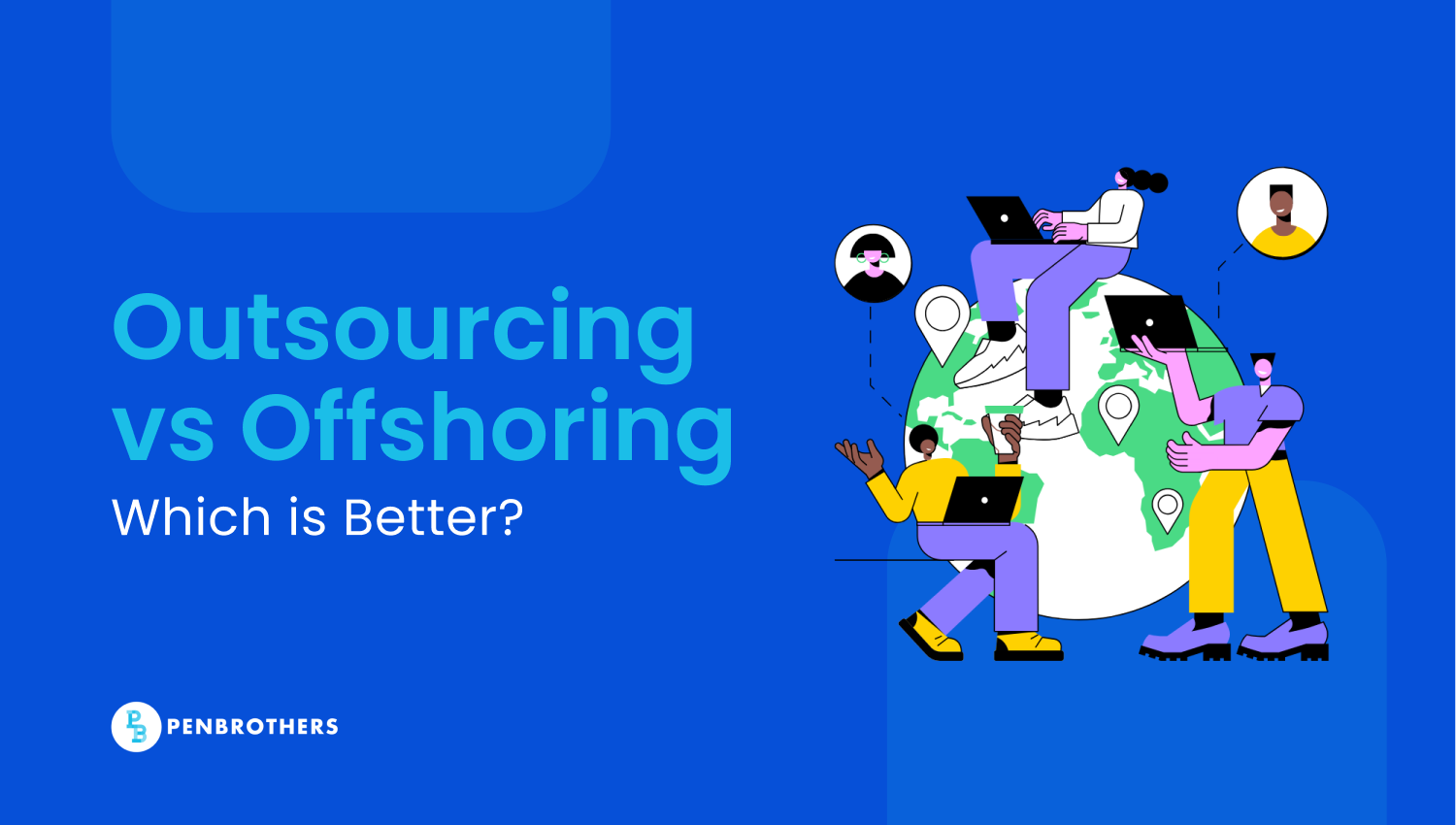Outsourcing vs. Offshoring: Which is Better for Your Business?

As your business grows, the demand for your services or products increases. At the same time, so does the amount of work that your team needs to deliver to meet the demand. That’s why, you’ll need to increase the efficiency of your workforce.
For large and small businesses, a reliable solution for improving their workforce’s efficiency is either outsourcing or offshoring.
The business process outsourcing industry is projected to have a compound annual growth rate (CAGR) of 9.4% from 2023 to 2030. This shows just how advantageous outsourcing business processes and offshoring staff are for many companies.
While offshoring and outsourcing are often mistaken for one another, they’re two different strategies.
If you’ve been considering either outsourcing some of your business functions or building an offshore team, then this article is here to help you decide between one or the other.
Key Similarities Between Outsourcing and Offshoring
Before going over the difference between outsourcing and offshoring, it’s a good idea to understand the similarities between the two. After all, there’s a reason people often mistake these two for one another.
Global Talent Acquisition Approach
One of the main similarities between outsourcing vs. offshoring is that companies take either or both of these approaches when they struggle to find the right talent for their open roles. Not only do they solve talent shortages, but they’re also a way to acquire highly skilled personnel globally.
Involving External Parties
Another similarity between the two is that they both involve your company needing to work with a third party in some capacity to find talent and fulfill business processes.
The degree to which you work with the outsourcing or offshoring service provider and your control over their work differs between the two. However, at the core of it, you’re relying on external parties to represent your company and act on your behalf.
Cost-Effectiveness Goal
Companies either outsource business processes or offshore talents because it’s one of the most cost-efficient ways to acquire talent without compromising on the quality of the workforce.
Outsourcing is a great way to access specialized experts more affordably upfront. On the other hand, offshoring is a great way to build a global team cost-effectively with more cost savings in the long term.
See also: Calculate Your Potential Cost Savings Through Offshoring!
Freeing Up Internal Teams
Outsourcing and offshoring can help free up your internal teams so that they can focus on your business’ core competencies or revenue-generating functions.
While some tasks and projects are still beneficial to your business, they may not directly or significantly contribute to your bottom line. That’s where both offshoring and outsourcing can be very helpful.
Main Differences Between Outsourcing and Offshoring
Now that you know their similarities, let’s distinguish between outsourcing and offshoring. Knowing the differences between the two can aid you in deciding whether one approach is better for your business’ talent acquisition challenges.
Advantages of Outsourcing Over Offshoring
Outsourcing is the process of delegating a business project or task to a third-party service provider or an independent contractor. Here are some of the advantages of outsourcing vs offshoring.
Increased Labor Flexibility

Outsourcing is a great solution for brief engagements and projects that need manpower. This increased labor flexibility makes it easier to fulfill business needs and processes on an as-needed basis rather than having to commit to employing a group of people when you’re sure you’re not going to need their skills after a certain period.
Less Tax Obligations
While both offshoring and outsourcing are cost-effective, outsourcing has the additional benefit of lower tax obligations because you’re not establishing a business practice in the country of your choosing.
Working with Specialists

One of the benefits of outsourcing is that it’s a faster way of getting a specialist from anywhere in the world to work with your company.
Sometimes, your business needs the expertise of a specialist, but you don’t have enough work for them to do that can justify an employment or long-term commitment. In that case, outsourcing a project or work task to a specialist is the best option for your company.
Advantages of Offshoring Over Outsourcing
Offshoring involves delegating your business process completely abroad. Let’s deepen your understanding of outsourcing and offshoring differences by going over the pros of offshoring.
Custom Long-Term Global Team
If you want long-term arrangements and equally long-term savings, then offshoring is the better solution for you. Offshoring is about building a team, except that they’re outside of the country where your business is based.
While offshoring requires more commitment and work to establish, it’s the best way to create a highly skilled and competitive global team—tailored to your specific requirements for each role—within your country of choice.
Read more: Offshoring Explained: What are the Pros and Cons?
Delegating Certain Business Functions
Offshoring is about dedicating the entire or a portion of your business processes and not just non-core work. Since you’re able to continue vital business processes at a lower price, that frees up your business to invest in scaling it more as well as increasing its profitability.
Higher Productivity Levels

You’ll find that many large-scale enterprises offshore some critical business processes such as:
- Customer service
- Manufacturing
- Software development
- Recruitment and human resources
- Other administrative processes
When you create an offshore team for certain business functions, you can scale your work without reducing its quality. That way, you’re increasing your business efficiency and productivity while keeping your costs down.
Related articles:
- Offshoring to the Philippines: A Viable Solution to Global Talent Challenges
- What is an Offshoring Strategy and How to Build Yours?
To Offshore vs. to Outsource: Which One is Right for Your Business?
After understanding the offshoring and outsourcing differences, you should have the information you need to decide whether one is better for your business over the other.
To give you clearer ideas before making that decision, here are some factors to consider when weighing outsourcing vs. offshoring pros and cons:
Costs
While both outsourcing and offshoring are cost-effective, offshoring has to take into account the infrastructure costs, taxes, wages, and more outside of just labor costs. That’s because you’re completely establishing a business process outside of your country.
If you partner with a reputable offshore staffing company, you’ll even be able to reduce the cost of talent acquisition while hiring highly skilled individuals.
Level of Control
While outsourcing offers lower costs, it requires you to give up some level of control, as the service provider manages the work for you while serving multiple clients.
If you prefer to get better control over your operations and the quality of work, go for offshoring because it will allow you to build and manage your remote team directly.
According to Nicolas Bivero, Penbrothers CEO and Co-Founder, building a remote offshore team provides a strategic advantage to businesses.
“You have direct control to handpick highly skilled individuals who perfectly match your project needs. This fosters a collaborative environment where clear direction and ongoing feedback are the norm—you’re actively involved,” he shares.
Having a strong culture of quality, your remote team seamlessly integrates with your local team, consistently exceeding expectations with their work, he adds.
With offshoring, you can handpick highly skilled individuals who perfectly match your needs, fostering a collaborative environment with clear direction and ongoing feedback.
Once you know where you stand on these three factors, you should have narrowed them down enough to know which choice is best for your business’ current stage of growth.
Language and Cultural Barrier

You’ll need a stronger core team that can communicate well in English if you plan on offshoring or outsourcing to another country.
You can avoid or minimize the language barrier by offshoring or outsourcing to the Philippines, which has a high English proficiency with an index score of 578.
Depth of Work
You should choose to outsource a task if it’s not a necessary business process that you need to do. For example, maybe you’re running a year-long marketing campaign, but you won’t keep running that campaign after the year ends. In that case, it’s better to outsource your marketing work.
On the other hand, for essential business processes, it’s better to offshore since you can reap the long-term savings and benefits that way. For example, offshoring your manufacturing is a great way to get skilled labor at a lower price than if you did it back home.
Final Thoughts
By knowing the difference between outsourcing and offshoring, you can accurately identify if or when your business needs one over the other. It makes you more efficient with managing your business’ workforce while increasing the productivity of your company and saving on costs at the same time.
Next time you have to hire global talent, consider getting a reputable service provider with a proven track record of building a highly skilled offshore team for your business.





